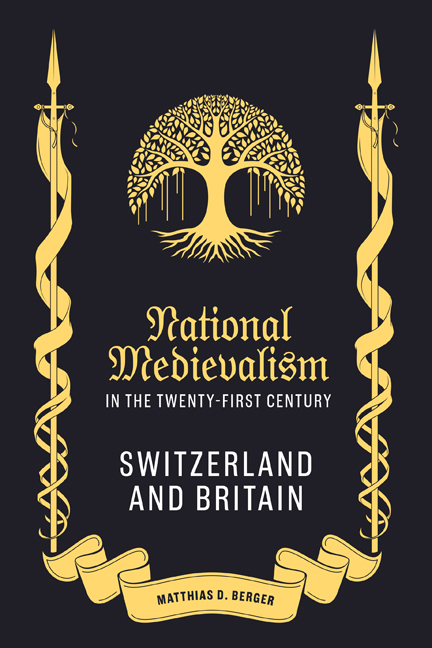Book contents
- Frontmatter
- Dedication
- Contents
- List of Illustrations
- Acknowledgements
- Author’s Note
- List of Abbreviations
- Introduction
- 1 Constructing Continuity: Four Nations Imagine Their Beginnings
- Part I The Politics of Autochthony
- 2 For Freedom Alone: The Scottish Independence Referendum
- 3 2016 and All That: Brexit
- 4 Freiheit statt Vögte: The Swiss National-Conservatives
- Part II The Others of National Medievalism
- 5 Masculine Middle Ages: Gender
- 6 In Strange Lands: Race, Ethnicity, Immigration
- Conclusion: The Demands of the Past
- Afterword: National Medievalism in the Age of COVID-19
- Bibliography
- Index
- Medievalism
3 - 2016 and All That: Brexit
Published online by Cambridge University Press: 17 December 2023
- Frontmatter
- Dedication
- Contents
- List of Illustrations
- Acknowledgements
- Author’s Note
- List of Abbreviations
- Introduction
- 1 Constructing Continuity: Four Nations Imagine Their Beginnings
- Part I The Politics of Autochthony
- 2 For Freedom Alone: The Scottish Independence Referendum
- 3 2016 and All That: Brexit
- 4 Freiheit statt Vögte: The Swiss National-Conservatives
- Part II The Others of National Medievalism
- 5 Masculine Middle Ages: Gender
- 6 In Strange Lands: Race, Ethnicity, Immigration
- Conclusion: The Demands of the Past
- Afterword: National Medievalism in the Age of COVID-19
- Bibliography
- Index
- Medievalism
Summary
I look at so many young people with the 12 stars lipsticked on their faces and I am troubled with the thought that people are beginning to have genuinely split allegiances.
OF THE POLITICAL events discussed in this section, the Brexit vote in the UK's EU membership referendum of 23 June 2016 was the most seismic. It set in motion a daunting process of constitutional disengagement that is likely to alter fundamentally the lived political, social and cultural reality of British citizens for decades to come. The implications for the cohesion of the UK are considerable. National medievalism played an important supporting role in preparing the ground for Brexit and has punctuated the Brexit process since. Simply put, the Middle Ages have been made to conjure both visions of former national greatness and the spectre of humiliation by foreign invasion. More specifically, the referendum and the Eurosceptic currents from which the Brexit vote flowed have insisted on obligating constitutional heritage and the need to stave off political ‘takeover’ that threatens that heritage.
As with the Scottish Independence Referendum, it would be an exaggeration to say that medieval imagery was dominant prior to the European referendum. With some notable exceptions, politicians rarely referred to medieval history in any substantial way. Besides, there was no British or English cultural scene that drew analogies to the medieval past to an extent comparable to the involvement of cultural nationalists before the Scottish Independence Referendum. Cumulatively, however, the European debate was inflected in important ways by medievalist imagery and rhetoric, which (public) historians, journalists and politicians deployed in books, newspaper coverage and op-eds, on blogs, online fora and social media.
Englishness as Britishness
A first observation to make about Brexit medievalism is that, in a political revival of Anglo-Saxonism and the closely related myth of the Norman Yoke, it overwhelmingly refers to the English Middle Ages. This is highly revealing, because leading Brexiteers have been keen to portray Brexit as a pan-British liberation movement, whereas I am not alone in seeing among the main drivers of Brexit an unspoken English nationalism working in tandem with predominantly English ideological traditions of Euroscepticism.
- Type
- Chapter
- Information
- National Medievalism in the Twenty-First CenturySwitzerland and Britain, pp. 96 - 111Publisher: Boydell & BrewerPrint publication year: 2023



